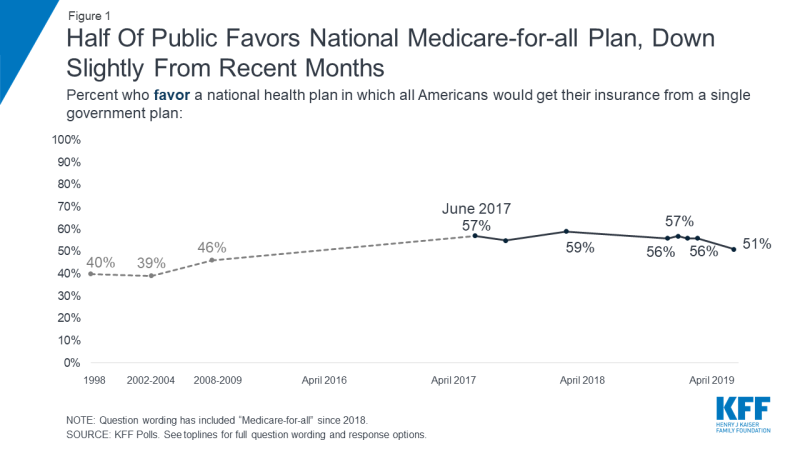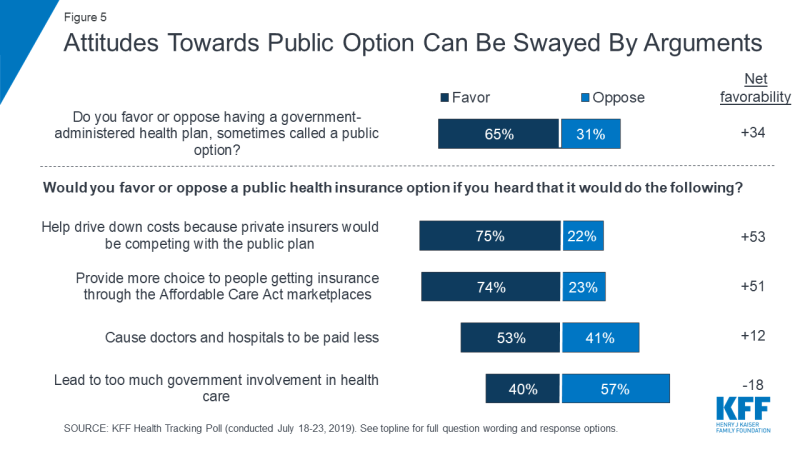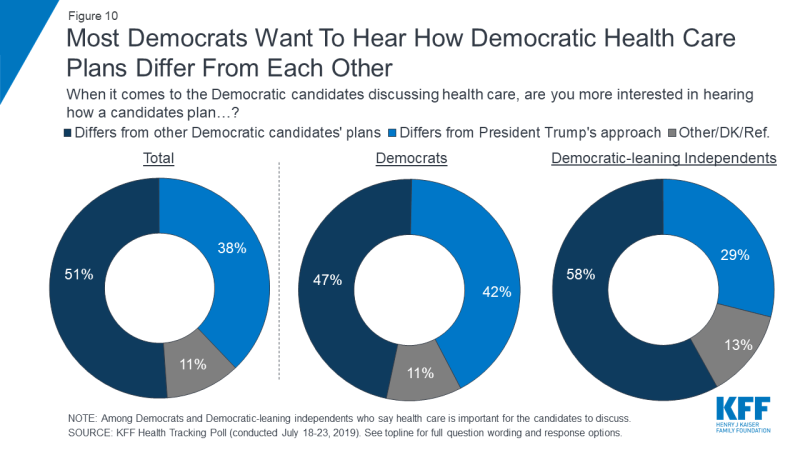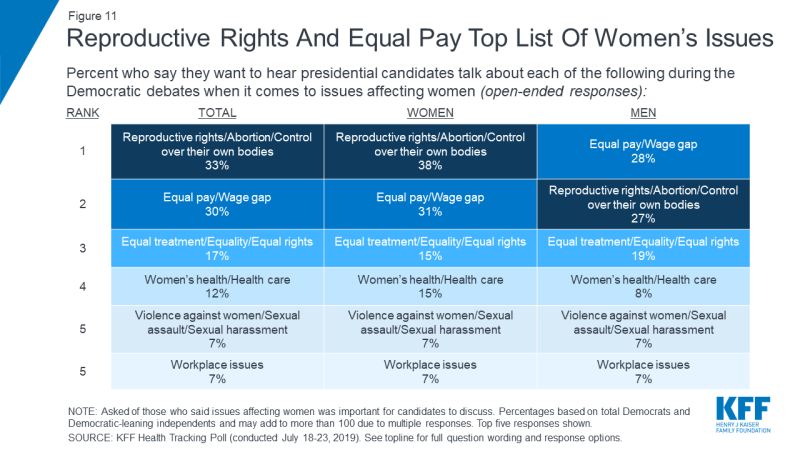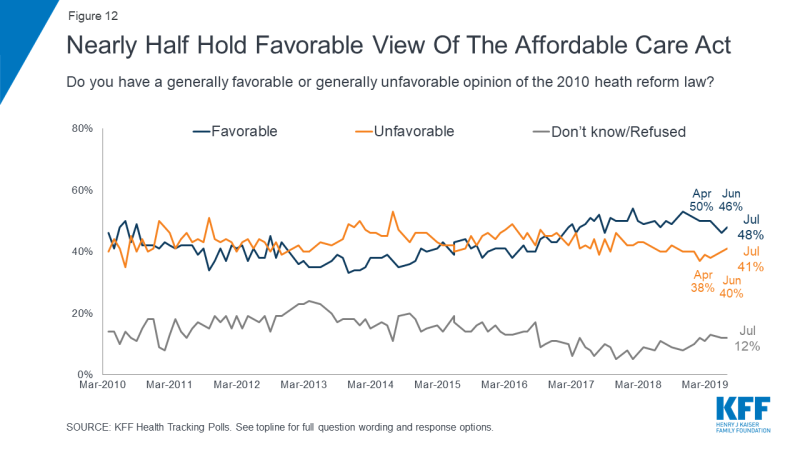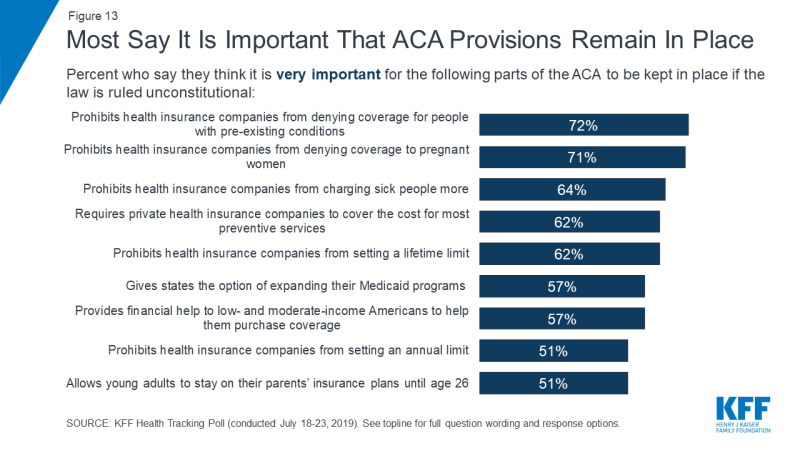KFF Health Tracking Poll - July 2019: The Future of the ACA and Possible Changes to the Current System, Preview of Priorities Heading Into 2nd Democratic Debate
Key Findings:
- Health care is playing a prominent role at the start of the 2020 presidential primary season with Democratic candidates offering competing proposals aimed at expanding coverage to more Americans. The latest KFF Health Tracking Poll finds a larger share of Democrats and Democratic-leaning independents preferring approaches that expand coverage building on the Affordable Care Act (55%) rather than replacing the ACA with a national Medicare-for-all plan (39%).
- The poll also finds a slight dip in overall favorability of the idea of a national Medicare-for-all plan. About half (51%) of the public now say they favor such a proposal compared to 56% in April 2019. On the other hand, nearly two-thirds of the public (65%) favor a public option, which would compete with private health insurance plans and be available to all Americans. But as with polling on Medicare-for-all, attitudes toward this change to the current health care system can be swayed by common arguments. For example, net favorability towards such a plan ranges as high as +53 and as low as -18 after hearing arguments either in favor of or against a public option.
- The survey finds that, while a majority of the public hold favorable views of Medicare (83%), the public also has largely favorable views of employer-sponsored insurance (76%) and Medicaid (75%). In addition, both those with Medicare coverage (95%) and employer coverage (86%) rate their own health insurance coverage positively.
- Health care, climate change, and issues affecting women are among the top issues that Democrats and Democratic-leaning independents want to hear the candidates discuss in the upcoming second Democratic presidential debate. Issues affecting women has consistently ranked among this group’s top issues for the candidates to speak about and when asked specifically what they want to hear about, at least three in ten overall offer topics related to reproductive rights (33%) and equal pay (30%).
- With the ACA and its various provisions under legal threat from an ongoing federal court case, this month’s KFF Health Tracking Poll probes the public on how important it is for different ACA provisions to remain in effect if the law is ruled unconstitutional. Most Americans say it is “very important” to them that each of the provisions included in this month’s survey are kept in place.
Public Opinion on the Competing Health Care Proposals Aimed At Expanding Coverage
Health care is playing a prominent role at the start of the 2020 presidential primary season with Democratic presidential candidates offering competing proposals aimed at expanding coverage to more Americans. This month’s KFF Health Tracking Poll examines public support for both a national Medicare-for-all plan and a government-administered public option.
Medicare-for-all
KFF has been tracking public polling on a national Medicare-for-all plan since the 2016 presidential campaign and this month’s tracking poll finds a slight dip in overall favorability towards Medicare-for-all. About half (51%) of the public say they favor such a proposal compared to 56% who said they were in favor earlier this year and a high of 59% more than a year ago in March 2018.
The gradual decline in favorability is driven by both Democrats and Republicans with somewhat smaller shares of both now saying they favor such a proposal. In addition, the share of Democrats who now say they “strongly favor” a national Medicare-for-all plan is down from 54% to 42% compared to last time it was asked in April 2019. A majority of Democrats (72%) still express favorable views towards this proposal.
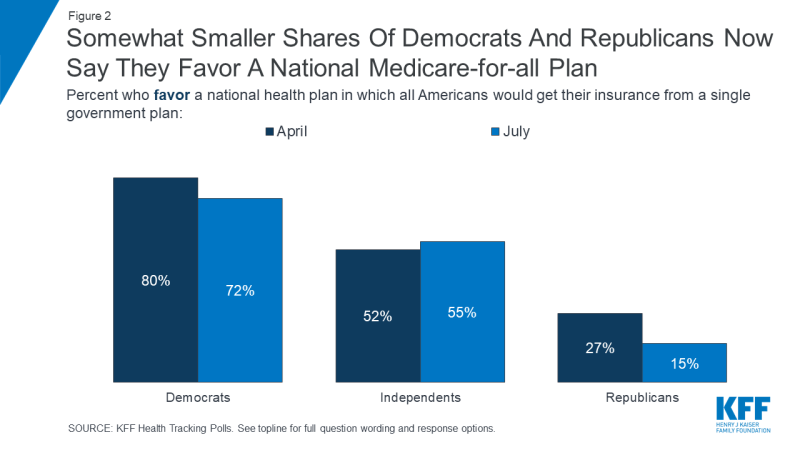
Figure 2: Somewhat Smaller Shares Of Democrats And Republicans Now Say They Favor A National Medicare-for-all Plan
Overall, a larger share of Democrats and Democratic-leaning independents would prefer lawmakers build on the existing ACA (55%) to expand health care coverage to more Americans rather than replace the ACA with a national Medicare-for-all plan (39%).
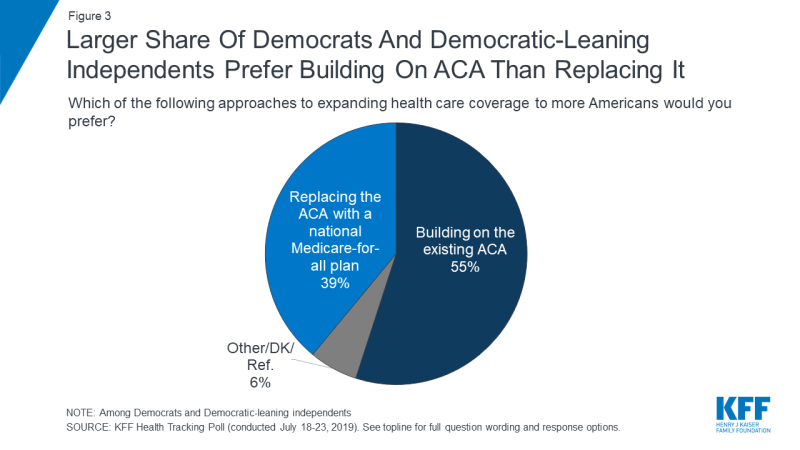
Figure 3: Larger Share Of Democrats And Democratic-Leaning Independents Prefer Building on ACA Than Replacing It
This is true across ideology (liberal v. moderate) as well as for self-identified Democrats. Similar shares of Democratic-leaning independents say they prefer replacing the ACA with a national Medicare-for-all plan (45%) as say they would prefer building on the ACA (50%).
| Table 1: Most Democrats Prefer Lawmakers Build On ACA | ||
| Which of the following approaches to expanding health care coverage to more Americans would you prefer? | Building on the existing ACA | Replacing the ACA with a national Medicare-for all plan |
| All Democrats and Democratic-leaning Independents | 55% | 39% |
| Moderate | 60 | 36 |
| Liberal | 56 | 37 |
| – | ||
| Self-identified Democrats | 57 | 36 |
| Democratic-leaning independents | 50 | 45 |
Public Option
Another type of government health plan garnering recent attention is a public option. This type of plan would allow everyone to have access to a public health insurance option like Medicare. Earlier this month, Democratic presidential candidate Joe Biden announced his own health care proposal, which builds heavily on the ACA – legislation passed during his term as Vice President in the Obama administration – and one element of which includes a public option. Previous KFF polling conducted in 2009, prior to the passage of the ACA, found about half of the public (47%) said a government-administered public health insurance option that would compete with private plans was an important feature of health reform.
Nearly two-thirds of the public (65%) favor having a government-administered health plan that would compete with private health insurance plans and be available to all Americans while 31% oppose. Views are largely driven by partisanship with majorities of Democrats (85%) and independents (68%) favoring a public option while a majority of Republicans oppose such a proposal (62%).
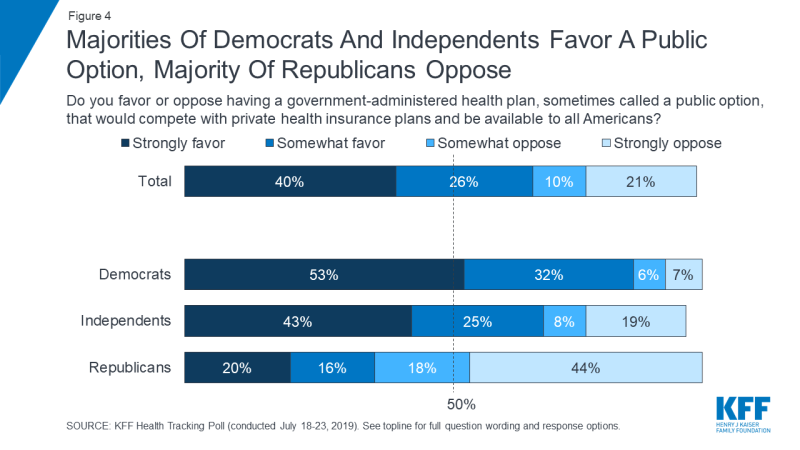
Figure 4: Majorities Of Democrats And Independents Favor A Public Option, Majority Of Republicans Oppose
Similar to previous polling on other proposed changes to the current health care system such as Medicare-for-all, attitudes towards a public option can swing significantly, depending on what arguments the public hears.
Net favorability towards a public health insurance option (measured as the share in favor minus the share opposed) starts at +34 percentage points and ranges as high as +53 percentage points when people hear the argument that this would help drive down costs because private insurers would be competing with the public plan. Net favorability is also high (+51 percentage points) when the public hears that this would provide more choice to people getting insurance through the ACA marketplaces. On the other side of the debate, net favorability drops to -18 percentage points when people hear the argument that it would lead to too much government involvement in health care. Net favorability also drops, but remains net positive (+12 percentage points) after people hear the argument that it would cause doctors and hospitals to be paid less.
Public’s Views towards Health Insurance Coverage
In the first set of Democratic presidential primary debates held last month, Medicare-for-all took a leading role with candidates debating the future of the current health care system. The July KFF Health Tracking Poll asks the public their overall impressions of both public and private health insurance programs as well as assesses how people covered by Medicare rate their coverage compared to those who have employer-sponsored coverage. The survey finds that while a majority of the public hold favorable views of Medicare, the public also has largely favorable views of employer-sponsored insurance and Medicaid, the government health insurance program for certain low-income adults and children.
Overall, 83% of the public hold a favorable opinion of Medicare, the government health insurance program for seniors and for younger adults with long-term disabilities, including 51% who view it “very favorably.” Somewhat similar shares hold favorable views of employer-sponsored insurance (76%) and Medicaid (75%). The public is more likely to hold a favorable view of Medicare, employer coverage, and Medicaid than private health insurance plans that people purchase on their own (59%).
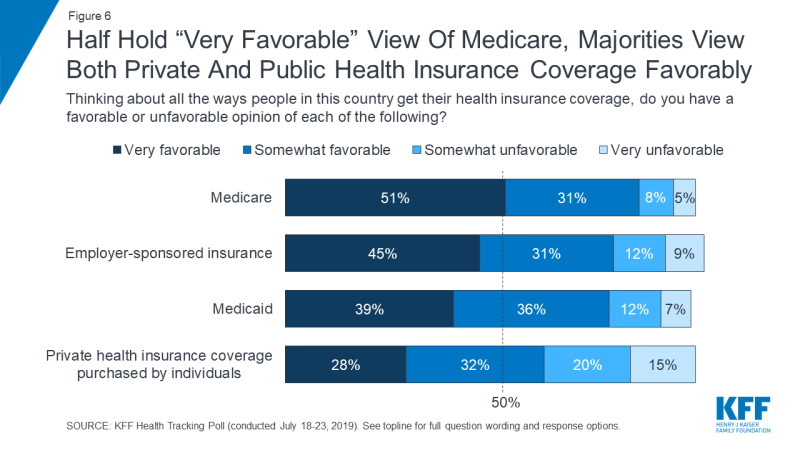
Figure 6: Half Hold “Very Favorable” View Of Medicare, Majorities View Both Private And Public Health Insurance Coverage Favorably
Medicare is also very popular across partisanship. More than eight in ten Democrats (84%), independents (84%), and Republicans (83%) say they have a favorable opinion of Medicare.
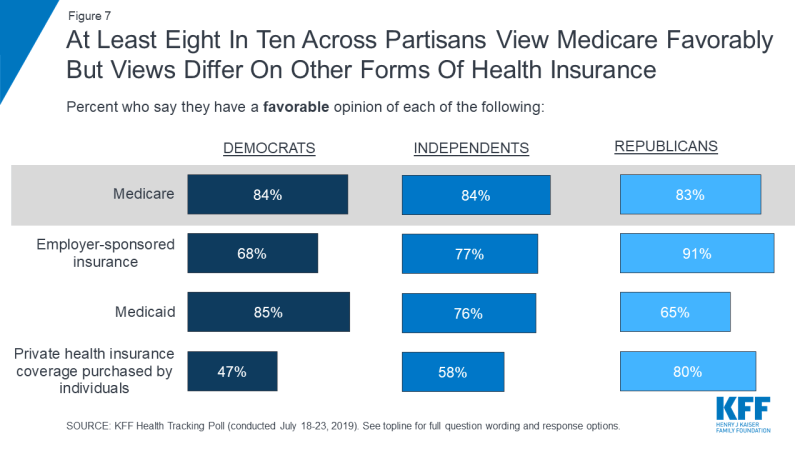
Figure 7: At Least Eight In Ten Across Partisans View Medicare Favorably But Views Differ On Other Forms Of Health Insurance
Views towards the other ways that Americans get their health insurance coverage vary across party identification. Republicans hold more favorable views of both employer-sponsored insurance (91%) and private health insurance coverage purchased by individuals (80%) than Democrats (68% and 47%) and independents (77% and 58%). On the other hand, Democrats hold more favorable opinions of Medicaid (85%) compared to both independents (76%) and Republicans (65%).
When asked to rate their own health insurance coverage, nearly half of older adults with Medicare coverage (65 and older) give their coverage an “excellent” rating (48%) and an additional 47% rate it as “good.” Five percent of older adults give their coverage a rating of either “not so good” (4%) or “poor” (1%). Fewer adults 18-64 with employer coverage give their own coverage an “excellent” (36%) rating, but half give their coverage a “good” rating. About one in seven give their coverage a rating of either “not so good” (10%) or “poor” (4%).
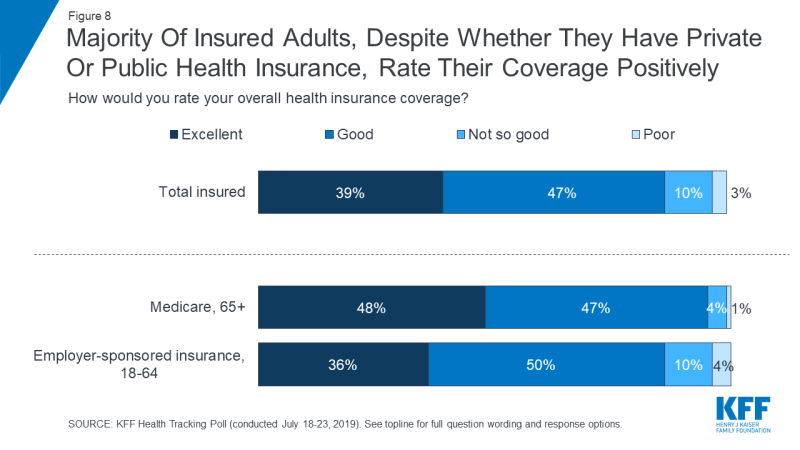
Figure 8: Majority Of Insured Adults, Despite Whether They Have Private Or Public Health Insurance, Rate Their Coverage Positively
Preview of 2nd Democratic Debates
Last month’s KFF Health Tracking Poll found health care leading the list of possible topics Democrats and Democratic-leaning independents want to hear the 2020 Democratic presidential candidates talk about during their upcoming debates. This month’s tracking poll, conducted a week prior to the second round of Democratic presidential debates, finds health care once again among the top issues along with climate change. Eight in ten Democrats and Democratic-leaning independents say it is “very important” for candidates to talk about health care (83%) and three-fourths (76%) say the same about climate change. This is closely followed by seven in ten who say it is “very important” for the candidates to talk about issues affecting women (71%) and immigration (69%). Majorities also want to hear the candidates talk gun policy (64%), criminal justice reform (62%), the economy (60%), income inequality (58%), foreign policy or national security (56%), and taxes (53%). Less than half (42%) say it is “very important” for the candidates to discuss international trade and tariffs.
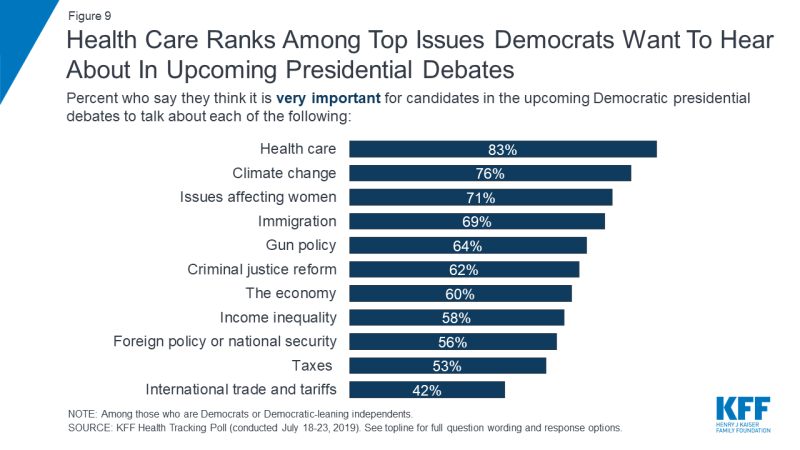
Figure 9: Health Care Ranks Among Top Issues Democrats Want To Hear About In Upcoming Presidential Debates
While there is a consensus among Democrats and Democratic-leaning independents that health care is the top issue they want to hear the 2020 presidential candidates discuss in the Democratic presidential debates, this group is more divided on whether they want to hear about how the candidates’ plans differ from each other or how they differ from President Trump’s approach to health care. About half of Democrats and Democratic-leaning independents (51%) say they want to hear how the Democratic plans differ from each other while four in ten (38%) say they want to hear how the plans differ from President Trump’s approach.
On this question, there is a difference between those who identify as Democrats and those who call themselves independents but lean towards the Democratic party. Nearly six in ten Democratic-leaning independents (58%) say they want to hear about how the Democratic plans differ from each other while fewer (29%) say they want to hear about how the plans differ from President Trump’s approach. Democrats are more divided, with similar shares saying they want to hear how the Democratic plans differ from each other (47%) and saying they want to hear about how the plans differ from President Trump’s approach (42%).
Issues Affecting Women
Over the past two months, women’s issues has ranked high on the list of possible topics that Democrats and Democratic-leaning independents want to hear the 2020 Democratic presidential candidates discuss in debates. When those who say issues affecting women is at least somewhat important for the candidates to discuss (which is 96% of all Democrats and Democratic-leaning independents) are asked to offer in their own words what specifically they want to hear about, a significant share of them offer reproductive issues. One-third of Democrats and Democratic-leaning independents overall say they want to hear the Democratic presidential candidates talk about reproductive issues such as abortion, reproductive rights, or women’s control over their own bodies. Similarly, three in ten Democrats and Democratic-leaning independents offer issues such as equal pay or the wage gap (30%). Slightly fewer offer equal treatment or equal rights (17%), women’s health care issues other than reproductive health (12%), workplace issues (7%), or violence against women and sexual assault (7%).
Democratic and Democratic-leaning women and men offer similar responses to what they mean when they issues affecting women is important for the candidates to discuss, with one exception. A larger share of Democratic women (38%) overall offer reproductive issues such as abortion, reproductive rights, or women’s control over their own bodies compared to the total share of Democratic men (27%).
The Affordable Care Act
About half of the public (48%) say they have a favorable opinion of the 2010 Affordable Care Act (ACA) while four in ten (41%) view the law unfavorably. Opinions have remained relatively unchanged for the past two years since the Republican efforts to repeal the law with a slightly larger share expressing positive views. Attitudes are also largely partisan with eight in ten Democrats having a favorable view of the ACA compared to nearly half of independents (49%), and a much smaller share of Republicans (14%).
Earlier this month, the U.S. Court of Appeals for the 5th Circuit heard oral arguments in Texas v. U.S., the court case challenging the future of the ACA in which a federal judge sided with Republican state attorneys general and ruled the entire ACA is invalid. 1 The future of this case is uncertain and it may be headed to the U.S. Supreme Court. About three-fourths (76%) of the public say they have heard at least “a little” about the ongoing legal battle over whether the ACA is unconstitutional.
If the judge’s decision takes effect, a host of ACA provisions would be eliminated. This month’s KFF Health Tracking Poll probes the public on how important it is for various parts of the ACA to remain in effect if the Supreme Court upholds the federal judge’s decision.
Across the provisions included in this month’s survey, most Americans say it is “very important” to them that each of the parts of the law are kept in place.
Majorities across partisans say it is “very important” that the ACA’s protections for people with pre-existing conditions remain in place. Nearly nine in ten Democrats (88%), 73% of independents, and 62% of Republicans say it is “very important” that the part of the law that prohibits private health insurance companies from denying coverage because of a pre-existing medical condition remains in place. Similarly, 76% of Democrats, 64% of independents, and 55% of Republicans say it is “very important” the part of the law that prohibits private health insurance companies from charging sick people higher premiums than healthy people remains in place.
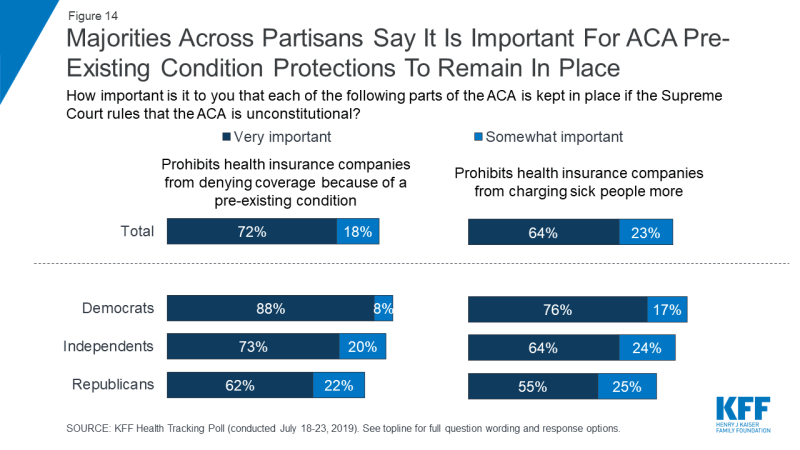
Figure 14: Majorities Across Partisans Say It Is Important For ACA Pre-Existing Condition Protections To Remain In Place
Yet, as anything related to the ACA, there are partisan differences. Majorities of Democrats and independents and nearly half of Republicans say it is “very important” the parts of the law prohibiting health insurance companies from denying coverage to pregnant women (89% of Democrats, 73% of independents, and 49% of Republicans), requiring health insurance companies to cover the cost of most preventive services (80% of Democrats, 58% of independents, and 49% of Republicans), and prohibiting health insurance companies from imposing lifetime limits (72% of Democrats, 65% of independents, and 48% of Republicans) remain in place. Across the other provisions asked about, fewer than half of Republicans say it is “very important” for these parts of the law to be kept in place including less than four in ten who say it is “very important” that Medicaid expansion (36%) and subsidies for people who buy their own health insurance (31%) to stay in place.
| Table 2: Partisans’ View On The Importance Of Various Aspects of ACA Remaining In Place if Supreme Court Rules the Law is Unconstitutional | |||
| Percent who say it is “very important” that each of these parts of the ACA are kept in place: | Democrats | Independents | Republicans |
| Prohibits private health insurance companies from denying coverage because of a pre-existing medical condition | 88% | 73% | 62% |
| Prohibits private health insurance companies from denying coverage to pregnant women | 89 | 73 | 49 |
| Prohibits private health insurance companies from charging sick people higher premiums than healthy people | 76 | 64 | 55 |
| Requires private health insurance companies to cover the cost for most preventive services | 80 | 58 | 49 |
| Gives states the option of expanding their Medicaid programs to cover more low-income, uninsured adults | 84 | 55 | 36 |
| Provides financial help to low- and moderate-income Americans who don’t get insurance through their jobs to help them purchase coverage | 82 | 54 | 31 |
| Prohibits private health insurance companies from setting a dollar limit on how much they will spend on your coverage during your lifetime | 72 | 65 | 48 |
| Prohibits private health insurance companies from setting a dollar limit on how much they will spend on your coverage each year | 67 | 46 | 38 |
| Allows young adults to stay on their parents’ insurance plans until age 26 | 68 | 50 | 36 |

